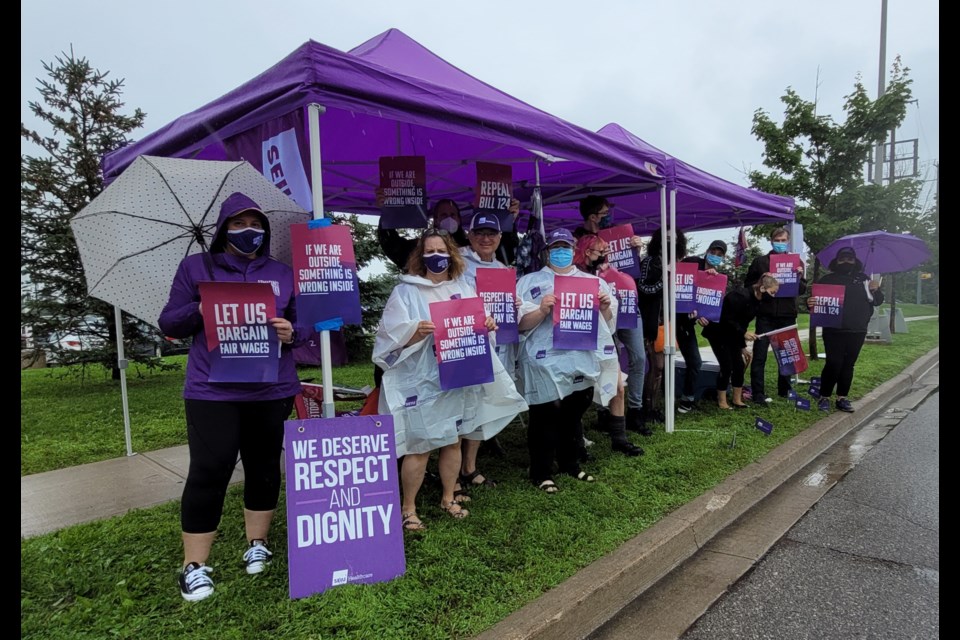Front-line staff working at Royal Victoria Regional Health Centre (RVH) in Barrie are speaking out about their dissatisfaction with how their employer and Premier Doug Ford’s provincial government are treating them.
Thursday's rally outside RVH saw approximately 20 people voicing their displeasure with Bill 124, which they say restricts them to a wage increase less than one-third the rate of inflation.
They say Bill 124 also impacts hospital workers’ ability to negotiate much-needed increases to mental health supports, such as psychotherapy and post-traumatic stress counselling.
Jen Frandsen, a registered practical nurse (RPN) in the Barrie hospital's emergency department, is also a Service Employees International Union (SEIU) steward at the health centre. She said today's rally was aimed at eliminating the bill while also obtaining proper compensation for workers.
“We’re here today to try to get Bill 124 repealed to allow for an increase that matches our worth,” Frandsen told BarrieToday. “Bill 124 limits total compensation to one per cent per year, and if that is directly out into wages, that is 2.4 per cent less than last year’s inflation rates.
"That means hospital workers are essentially taking a pay cut after working through a pandemic," she added.
Frandsen pointed out the mental health aspect of the pandemic and says that with the one per cent, staff can’t negotiate for mental health help in the negotiations.
“This has been very tough — we’ve been through a lot. Ford keeps saying how much he and the province appreciate what we’ve been doing, but gratitude is not enough,” Frandsen said. “He calls us heroes, but treats us like zeroes.”
Barrie-Springwater-Oro-Medonte MPP Doug Downey, who is also the province's attorney general, said “they’re not cuts” and that it still allows people to move through the salary grids.
“Whether it's through experience, qualifications or seniority, nurses, like many other professions, have a salary grid that gets bumped up as they move up,” Downey told BarrieToday in a phone interview this afternoon. “That is still happening here as they just recently negotiated those rates with the Ontario Nurses Association and hospitals.
"So they’re not getting cuts; the grid itself actually moves up one per cent. It's an increase, just maybe not as big as they want," the MPP added.
A statement from SEIU Healthcare, along with CUPE’s Ontario Council of Hospital Unions (OCHU/CUPE), said they began bargaining with the Ontario Hospital Association (OHA) last month and will return to the table in early September.
Frandsen hears people saying they feel for the front-line workers, but believes they aren't grasping how hard it has been these past several months.
“We’ve worked longer-than-usual hours, we’ve dealt with COVID head on, not seeing our families in order to be safe and have watched so many people die,” she said. “The public support is appreciated, but we need to feel appreciated by our government and employers through proper compensation.”
Downey said he appreciates what front-line workers have been through during this pandemic and knows it has been difficult. He also says that's why the provincial government gave a temporary increase of approximately $3,500 for a 16-week period.
“That was real money to show that we know what great work they are doing,” Downey said. “Bill 124 covers about a million employees across the sector and, while it is about trying to create stability and balance through an increase, we still have a responsibility to be fiscally responsible.”
Downey provided a hypothetical example of a nurse named Lydia who, as of April 2020, has seven years of experience under her belt and would be earning an hourly wage of $44.08.
This wage band increases by one per cent between April 2020 and April 2021, meaning that all nurses with seven years of experience would earn $44.52 starting in April 2021.
However, because Lydia will have gained a year of experience, starting April 2021 her hourly wage would be $47.69, which amounts to an increase of around 8.2 per cent in wages from one year to the next.
Downey said this illustrates that while the growth of the salary band is capped at one per cent, nurses like Lydia will see wage increases that are significantly higher on account of their increased experience.

.png;w=120;h=80;mode=crop)

